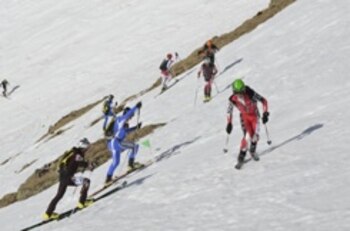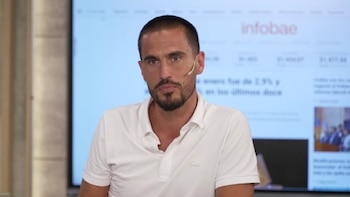
(ATR)General Jean-René Bachelet tells Around the Ringshe will seek "tobuild a little piece of a more peaceful world" with the Annecy 2013 CISM World Winter Games.
In this wide-ranging interview conducted at the month-to-go mark until the Games, the president of the organizing committee also touches upon the history of military sport and the role of the CISM in today's society.
Around the Rings: Tell me a bit about theInternational Military Sports Council and, more specifically, the CISM World Winter Games.
General Jean-René Bachelet: As you may know, CISM was created in 1948 by French officers who believed it was more important to fight on the sporting battlefield than on the battlefield – that is was better to make sport than to make war.
For a long time, their main activity was to organize championships among members, a program built around friendship through sport.
Some years ago, they had a new idea, which was to organize new Games that could be a kind of pre-Olympic Games.
And the reason why there were having this idea is because a lot of countries that were members of the CISM, a lot of their athletes were competing at the Olympic Games, so it was logical to have them getting prepared for the Games.
They began with the Summer Games in Rome in 1995, and three years ago, they held the first edition of the Winter Games in 2010 in Aosta Valley, Italy.
The main difference between the original championships they were holding at first and now the new Games formula is that in the beginning it was only sportive meetings among the membership. They have 133 member nations of the CISM and, for example, we will have 40 of them in March, so the main difference is they wanted to build a stronger link between the army and the population and they wanted to create a kind of momentum between the army and the population.
ATR: How ready is Annecy with a month to go until the Games?
JRB: As you may know, the decision of the CISM to let France organize these World Winter Games was delivered at the same time thatAnnecy was bidding for the Olympic Games for 2018.
As you may know regarding the bidding progress, the sporting venues were almost ready because they were part of the original project – not all of them but some of them because it’s a smaller event – so as you can imagine with one month to go before the event, we are not ready, but we are almost ready, and I’m sure that we will be on. We expect people to be on time, and we will be on time for sure.
ATR: How did last week’s visit from the CISM Commission go?
JRB: Of course, maybe you won’t believe me if I tell you it was a very good moment and a very good Commission, but in fact it was because they could observe just what I told you before – we are almost ready, and they are now sure and they know we will be ready on time.
ATR: Can you give me an idea of some of the numbers you’re expecting for the Games? How many athletes? How many countries? How many sports?
JRB: As I told you before, we are expecting 40 nations. We are expecting traditional winter nations such as the European ones – Germany, Italy, the Nordic countries, Switzerland and, of course, France. But we also have very important delegations like the Russians, China and the U.S.
Of course, at this event we will have eight major sporting disciplines – the traditional Olympic sports of alpine skiing, cross-country skiing, short track speed skating and biathlon, but we will also have the very original sports that are not so famous such as ski orienteering, ski mountaineering, indoor sport climbing and the patrol race.
ATR: How big a deal are these Games for Annecy? It’s a city with Olympic ambitions, obviously. Is this something the city can build upon going forward?
JRB: First of all, we can say that having these kind of Games, we are not upset. The reason is not because we didn’t have the Olympic Games. We are happy with these Games.
These Games are a major event, and it’s a great event.
I cannot answer this question for the mayor of Annecy, Jean-Luc Rigaut, or for the president of the General Council of Haute-Savoie, Christian Monteil, but I can answer from my perspective as a former military person and as the current president of Annecy 2013.
I do think there was no better option than this territory for these Games.
Regarding skiing and alpine events, we are here on venues that are part of the best skiing resort in the world, and we are a leading sport destination.
Besides that, we are a territory that has a very strong historical link between military and the population.
It’s thanks to military people that skiing sport and alpinism were introduced in our territory, in our region.
Secondly, it’s thanks to the history of World War II and because of the high level of the resistance people that were involved here in this territory and thanks to spatial links between military people and the population again.
So now you know that what we are trying to do is to demonstrate with this event that we have a kind of real strong link between the army and the population, and you will see this is the reason we will achieve success with these Games.
You will see that this meeting between the army and the population will find its way thanks to the excellence in sport that we will achieve with these Games because during these Games, we will have the best athletes, the best actual champions on the civilian field being there.
Dario Cologna of Switzerland; Giuliano Razzoli, Federica Brignone and Arianna Fontana of Italy; Lars Berger of Norway; Jeremy Teela of the U.S.; and French stars Tessa Worley, Simon and Martin Fourcade, and Adrien Theaux are just some of the 1,000 athletes from 40 nations that will headline the largest-ever military sports event to be hosted in France.
Worley, who is from Le Grand-Bornand won giant slalom gold at the FIS Alpine World Ski Championships earlier this month in Schladming, Austria, and Martin Fourcade won gold at the Biathlon World Championships in Nove Mesto, Czech Republic. Both are surgeons in the French army.
There will also be a lot of other top champions that you probably know better than me.
All of them will be part of the Games, and they are very good examples of the best champions that army can provide.
ATR: Is there anything else I should be asking, or anything else you wanted to share with me?
JRB: I really wanted to focus on the fact that the CISM is really a great event, and it’s very important for us to succeed, and we hope we will be able to build a little piece of a more peaceful world, so that’s what we are trained to reach by doing this event.
Interview conducted by Matthew Grayson
20 Years at #1: Your best source of news about the Olympics is AroundTheRings.com, for subscribers only.
Últimas Noticias
Sinner-Alcaraz, the duel that came to succeed the three phenomenons
Beyond the final result, Roland Garros left the feeling that the Italian and the Spaniard will shape the great duel that came to help us through the duel for the end of the Federer-Nadal-Djokovic era.
Table tennis: Brazil’s Bruna Costa Alexandre will be Olympic and Paralympic in Paris 2024
She is the third in her sport and the seventh athlete to achieve it in the same edition; in Santiago 2023 she was the first athlete with disabilities to compete at the Pan American level and won a medal.

Rugby 7s: the best player of 2023 would only play the medal match in Paris
Argentinian Rodrigo Isgró received a five-game suspension for an indiscipline in the circuit’s decisive clash that would exclude him until the final or the bronze match; the Federation will seek to make the appeal successful.

Rhonex Kipruto, owner of the world record for the 10000 meters on the road, was suspended for six years
The Kenyan received the maximum sanction for irregularities in his biological passport and the Court considered that he was part of a system of “deliberate and sophisticated doping” to improve his performance. He will lose his record and the bronze medal at the Doha World Cup.

Katie Ledecky spoke about doping Chinese swimmers: “It’s difficult to go to Paris knowing that we’re going to compete with some of these athletes”
The American, a seven-time Olympic champion, referred to the case of the 23 positive controls before the Tokyo Games that were announced a few weeks ago and shook the swimming world. “I think our faith in some of the systems is at an all-time low,” he said.




